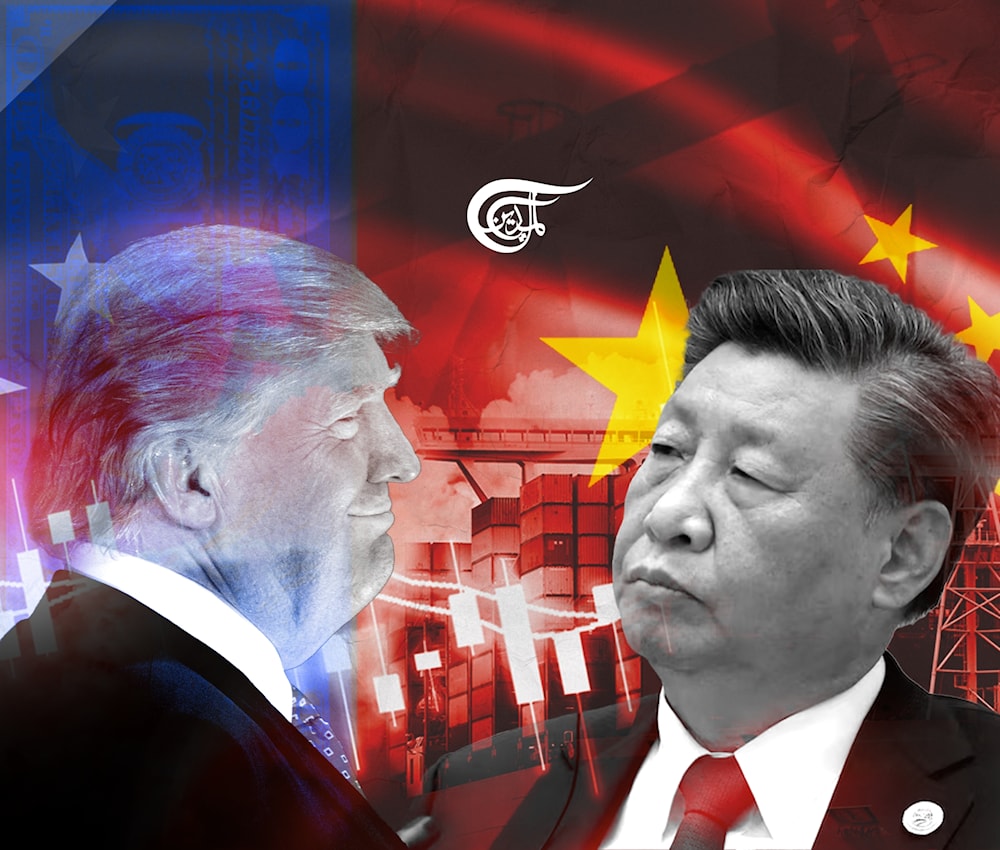The tariff gambit: A battle for the soul of globalization
China’s latest move to impose 125% tariffs on US goods—effective April 12, 2025—marks a watershed moment in one of the most volatile chapters of the Sino-American trade war.
-

By targeting China’s status as the "factory of the world," Trump seeks to reassert American industrial primacy (Illustrated by Mahdi Rail; Al Mayadeen English)
As global markets reel under intensifying geopolitical tremors, China’s latest move to impose 125% tariffs on US goods—effective April 12, 2025—marks a watershed moment in one of the most volatile chapters of the Sino-American trade war. Far from a reactionary measure, Beijing’s response signals a recalibrated strategic posture: one that balances tactical restraint with sovereign defiance. It is no longer a matter of economic retaliation—it is the crystallization of a broader contest over global power, legitimacy, and systemic alternatives to Western-led globalization.
A shift from defensive posture to assertive doctrine
Unlike previous episodes of trade friction, this latest escalation by China is not couched in the language of compromise or deterrence. Instead, it represents a deliberate pivot toward a two-pronged approach: containment without capitulation and assertion of economic sovereignty. President Xi Jinping’s public declaration—“We are not afraid… Hostility toward the world leads only to isolation”—was as much a message to Washington as it was to the hesitant capitals of Europe. Delivered against the backdrop of an appeal to EU leaders to resist "economic bullying", Xi’s words reveal a concerted effort to reshape the narrative, casting China as a defender of global economic pluralism in contrast to US protectionism.
The Chinese Ministry of Finance echoed this posture, announcing that Beijing would not engage in further escalation, regardless of future US tariff hikes. Rather than a concession, this signals a calculated devaluation of Washington’s punitive instruments. The underlying message: the cost of America’s unilateralism will now be borne by its own consumers, its industrial base, and the very fabric of its domestic political consensus.
Tariffs as instruments of strategic realignment
China’s economy enters this phase of confrontation from a position of internal fragility. With property markets in sustained decline, youth unemployment on the rise, and consumer confidence eroded, exports remain the last bastion sustaining growth targets. Thus, the decision to raise tariffs—though bold—is tempered by economic pragmatism. Beijing is acutely aware that overt escalation could deepen deflationary pressures and derail Xi’s ambitious transformation agenda to position China as a global hub of advanced manufacturing and technology.
Yet, Beijing is not without recourse. The government is preparing a suite of fiscal and monetary responses, ranging from liquidity injections to household consumption subsidies and industrial upgrade incentives. While such measures are not new, their implementation now carries a sense of urgency: the more Washington tightens the noose, the more determined China becomes to stimulate endogenous growth and fortify domestic resilience.
From the American side, President Donald Trump’s decision to impose a blanket 145% tariff on all Chinese goods is not merely protectionist overreach—it is a calculated maneuver to simultaneously compress China’s economic breathing space and undermine its technological ascent. Analysts warn that the next phase may involve expanded export controls targeting critical technologies like semiconductors, biotech equipment, and precision manufacturing tools—sectors where China remains acutely vulnerable.
Beijing’s tariff response, therefore, must be interpreted not only in economic terms but as a geopolitical declaration: China will not be coerced into submission, nor will it allow its global economic role to be dictated by the will of a single adversary.
Europe: A pivot point between alignment, autonomy
China’s rhetoric toward Europe in recent weeks has been unusually pointed and strategic. Xi’s direct appeal to Spanish Prime Minister Pedro Sanchez was more than diplomatic protocol—it was a calculated attempt to frame the European Union as a potential third axis in the emerging global order. By urging Brussels to resist American unilateralism and embrace "strategic autonomy", Beijing is offering the EU not just market access but also a geopolitical alternative.
However, this overture comes at a time when European policymakers are increasingly wary of Chinese overcapacity and industrial dominance. The so-called "export tsunami" that may result from the loss of US market access will inevitably redirect Chinese goods toward Europe and the Global South, raising the specter of new protectionist backlashes. The continent thus finds itself caught in a precarious balancing act: recalibrating its dependence on Chinese supply chains while resisting US pressure to fully decouple.
Beyond trade: The battle for the soul of globalization
What began as a tariff dispute has evolved into a confrontation over the architecture of globalization itself. Trump’s trade doctrine is not simply transactional; it is revisionist, aimed at dismantling the very mechanisms that have underpinned global trade liberalization for decades. By targeting China’s status as the "factory of the world," Trump seeks to reassert American industrial primacy—albeit through coercive rather than competitive means.
China, for its part, is defending more than export revenues. It is defending a model of development that challenges the post-2008 liberal economic order, a model predicated on state-led capitalism, infrastructural leverage, and global South partnerships.
Yet the costs are steep on both sides. American consumers face price shocks across key sectors, from electronics to energy. Meanwhile, Chinese manufacturers grapple with order cancellations, layoffs, and market uncertainty. Global investor confidence is fraying, with institutions like Goldman Sachs revising China’s GDP projections downward, in some cases below the symbolic 4% threshold.
What lies ahead
At this juncture, the trajectory of the trade war remains uncertain. What is clear, however, is that China is no longer willing to absorb the shock silently. The era of "strategic patience" appears to be over. In its place emerges a more confrontational yet calibrated China, one that blends nationalistic resolve with economic realism.
Whether Xi Jinping can turn this crisis into an inflection point for structural reform and deeper self-sufficiency remains an open question. Equally uncertain is whether Trump’s tariff blitz will yield domestic revival or accelerate fragmentation within the global economy.
Either way, this conflict has already transcended the language of trade policy. It has become a stress test for the postwar economic order, and the world may soon discover that it is no longer fit for its purpose.

 Mohamad Seifeddine
Mohamad Seifeddine
 6 Min Read
6 Min Read










